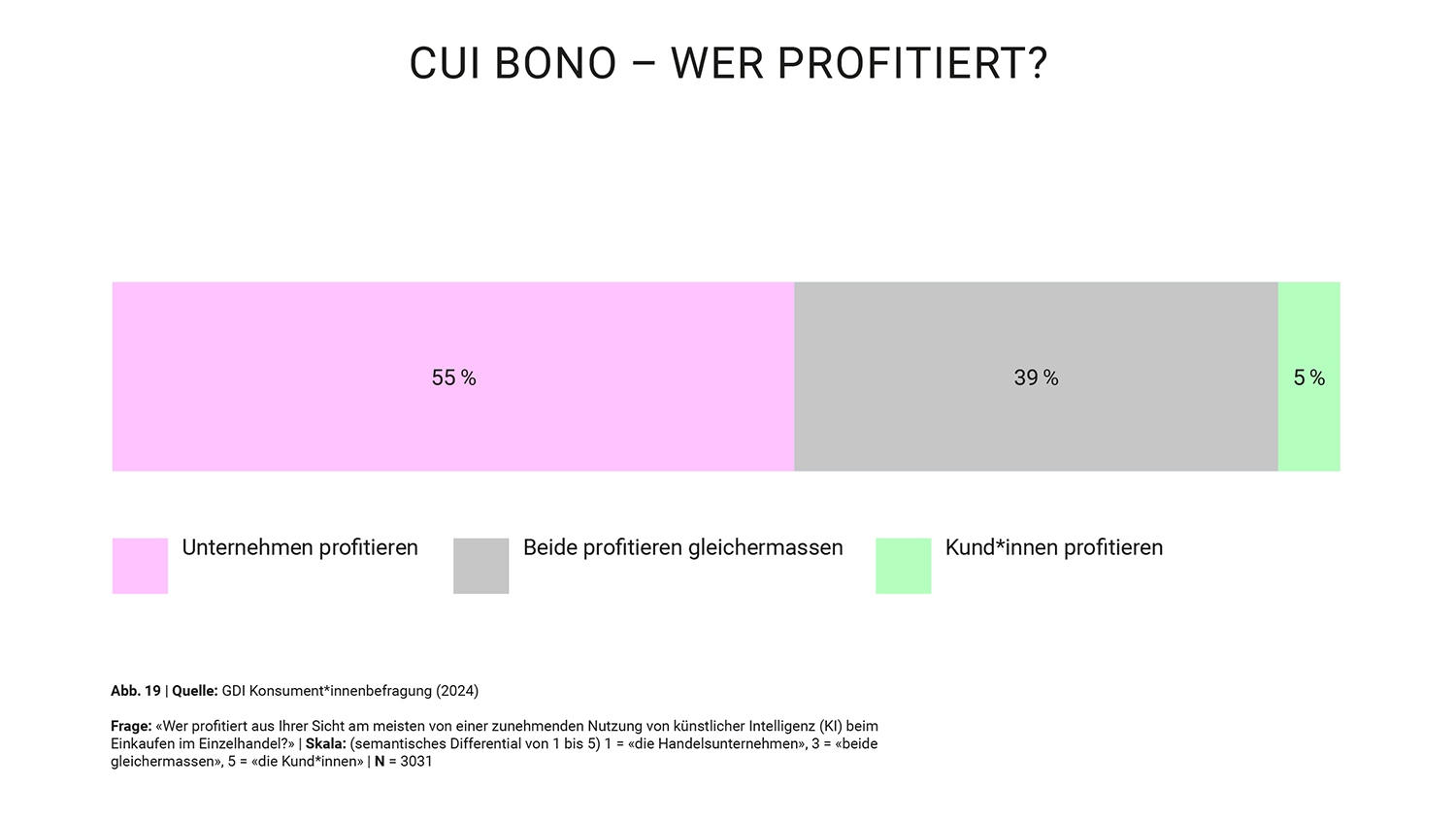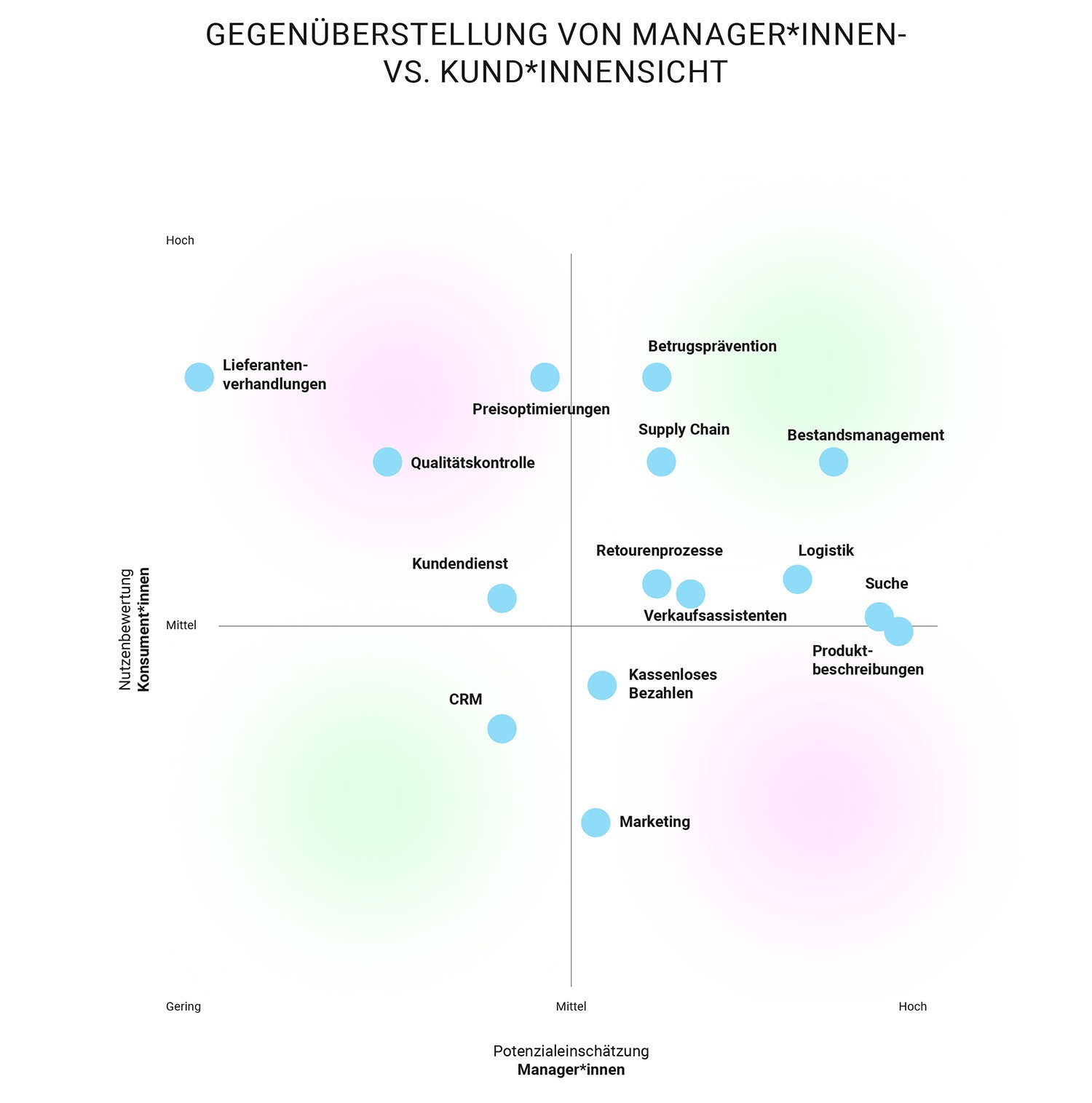What drove the GDI to conduct the study?
Johannes Baur: When we decided on the focus of our new retail study, AI was omnipresent – new forecasts were constantly being generated, from a possible doubling of GDP to billions invested in AI start-ups. The debate was dominated by large tech companies such as OpenAI, Meta, Google and NVIDIA. However, the more we looked into it, the clearer it became that there was a lack of focus on what is actually happening in the companies in our region and what people think about the topic of artificial intelligence.
Gianluca Scheidegger: This is exactly where we wanted to start. We were interested in the actual position of retail companies as regards AI? What are they working on specifically? And is this in line with the needs and expectations of their customers? We wanted to capture the mood and opinions of the population and look into the question of whether companies are on the right track with their AI initiatives – or whether they are ignoring people and their needs. For this reason, we chose to interview both company representatives and consumers in our survey.

Dr. Gianluca Scheidegger is a Senior Researcher and speaker at the GDI Gottlieb Duttweiler Institute. He analyses social, economic, and technological changes with a focus on retail and consumer behaviour.
Which findings from the study surprised you the most?
Johannes Baur: One of the most surprising findings was the clear pessimism of consumers. The majority expect AI to make matters worse – in terms of service and prices, for example, even though companies assume that AI will primarily bring benefits. There was also a significant conflict of objectives between management focus and customer expectations, as companies are investing in AI areas that are of little benefit to customers.
Gianluca Scheidegger: I was surprised at the level of ambivalence in the relationship between consumers and sales staff. On the one hand, in-store employees are vital for many people and are often even the main reason for not buying online. On the other hand, many people would prefer not to be approached by sales staff and would like to shop with as little disturbance as possible. I found it astonishing that almost half of those surveyed felt that less human contact was an advantage of AI.
Most respondents expect artificial intelligence to make matter worse instead of bringing about an improvement. From where does this pessimism stem?
Gianluca Scheidegger: Quite simply, many people simply don't trust companies to work with and use AI responsibly – there is a clear sense of mistrust, ethical concerns and a fear of losing control. Approximately 75% of respondents fear the misuse of AI, with almost as many afraid of manipulation through false information, and around two-thirds seeing their privacy being put at risk. And is there any confidence in the concrete benefits? Only 5% believe that customers will really benefit in the end. On the other hand, more than 50% clearly see that the main parties to benefit will be the companies themselves.

Johannes Baur: And what is surprising in this context is that the managers' assessments largely coincide with these fears. Many companies want to primarily use AI to increase their cost efficiency. At present, the management discussion revolves almost exclusively around what could be automated. There is a lot of experimentation without a concrete strategic goal and usually detached from the question of whether and how these automation measures can generate value for customers and employees. It even seems as if managers are consciously accepting cutbacks for customers and employees.

Dr. Johannes C. Bauer is Head Think Tank at the Gottlieb Duttweiler Institute. In his research, he examines changes in consumer and purchasing behaviour, the future of retail against the backdrop of long-term consumer, technology and business model trends, as well as the opportunities and risks of digitalisation for business and society.
Can people even assess the impact of AI in retail when there are still few useful tools for end consumers?
Gianluca Scheidegger: This was precisely one of the biggest challenges of our study – to get a reliable picture of how the population feels about AI. Many people have not had much, if any, conscious contact with AI – or they use applications such as personalised recommendations, chatbots or automatic translations without perceiving them as "AI". Accordingly, many opinions are based more on abstract ideas, media reports or general concerns rather than on actual experience.
Many people use applications such as personalised recommendations, chatbots or automatic translations without perceiving them as "AI"
Johannes Baur: The study shows very clearly that attitudes towards AI depend heavily on the individual's understanding of technology. People with an affinity for technology—such as younger people and academics—are much more open to AI. They are more likely to see the opportunities it provides and are more curious and less suspicious. Others, on the other hand, tend to feel overwhelmed by the dynamics, which reinforces pessimism and scepticism. Understanding these differences is crucial for establishing AI on a broad scale.
AI is not a customer requirement in retail, but at the same time many companies are investing in such applications. How does this discrepancy come about?
Gianluca Scheidegger: Exactly, AI is not a customer need per se. Just because AI has been used in one area, it doesn't mean that consumers automatically think it's better. There needs to be a tangible, concrete benefit – be it faster help, lower prices, better recommendations or less effort when making purchases. And this is precisely where the problem lies. Many companies invest in AI because they feel compelled to do something with AI in order not to be left behind by their competitors. The question is then often: "What can we optimise?". However, companies are rarely asking: "What would actually solve a customer problem?" And as long as this line of questioning isn't addressed, technological progress will remain abstract and even disruptive for many customers.
According to the survey of managers, companies primarily want to invest in AI in areas in which customers see the least benefit. Have retailers lost their customer focus?
Johannes Baur: Personalised advertising is a good example. Retail companies are investing heavily in AI, because they expect it to increase efficiency and conversion rates. For the vast majority of people, however, more or better advertising is not a need – they often find it annoying, even if it is well tailored to them. And this is precisely the problem that our study shows: AI is frequently used in areas where there is an advantage from the company's point of view, but no real added value from the consumer's perspective.
AI is frequently used in areas where there is an advantage from the company's point of view, but no real added value from the consumer's perspective.
In the last five years, satisfaction with sales staff has decreased. This could be due to a shortage of skilled labour, cost pressure and (partial) automation. How could AI support staff in the future?
Gianluca Scheidegger: Something that we clearly noticed in the study is that when consumers criticise the service in bricks-and-mortar stores, it's almost always about two points – a lack of staff availability and insufficient expertise. This is exactly where AI could be worthwhile. If it relieves sales staff of routine tasks such as stock queries, returns and administrative tasks, capacity can then be freed up and employees can be more responsive to customers again. At the same time, AI can help to provide specialist knowledge in a structured and contextualised manner – in other words, it can provide precisely the information that is needed in each situation where a customer is looking for advice. This is a real added value, especially for complex products or new employees. However, it is vital that AI must not be an excuse to simply lay off staff. It should be used to strengthen and empower the people working in the shop. And if companies do decide to reduce staff numbers, then this must provide noticeable advantages for customers – for example in the form of lower prices or other specific benefits.
The study presents a framework called TRADE. TRADE is designed to support companies in implementing a customer-oriented AI strategy. What are the most important findings from this framework?
Johannes Baur: The TRADE framework should not be seen as a ready-made guide on how companies should use AI. Rather, it is an invitation to take a step back – before companies get lost in the technical possibilities and any potential increases in efficiency. The main idea behind this is to first consciously reconsider what your own company actually stands for, what the strategic goal is and how AI can actually help you to better fulfil your own value proposition to customers. It is therefore not about using AI for AI's sake, but rather where it fits in with the identity and direction of the company. It is precisely these considerations that TRADE aims to support – by showing examples of how AI can be sensibly implemented together with various retail strategies.
It is not about using AI for AI's sake, but rather where it fits in with the identity and direction of the company.
Where do you currently see there to be the greatest potential for using AI that offers real added value for both companies and customers?
Johannes Baur: In our study, we summarised the conflicting priorities between the company's perspective and customer expectations in a matrix. On one axis, there is the management's assessment of potential—i.e. where efficiency gains or savings can be expected—and on the other, the perceived added value from the customer's perspective. To this end, we translated the planned investments into concrete value propositions for the consumer questionnaire. For example, if companies invest in fraud prevention measures, this would mean that customers can benefit from secure payments and the trustworthy handling of personal data in particular.

Gianluca Scheidegger: And this is where it gets exciting, because there are some areas where management potential and customer benefit overlap very well. These include improved search functions, optimised inventory management, intelligent sales assistance, fraud prevention and improved product descriptions. These are all things that will help people in their everyday lives, as it will allow them to find products more quickly, get the relevant information, pay securely and receive their order as quickly as possible.
Smart and human: AI amidst the conflicting priorities of maximising efficiency and customer centricity
A representative survey of over 3,000 consumers in the DACH region sheds light on the uncertainties and needs of customers. A survey of around 300 retail managers in Germany and Switzerland shows whether companies are taking these concerns seriously. The TRADE framework offers practical support for the successful implementation of AI measures based on the findings of the study.
Genuine interactions remain important in retail, even with the use of AI. Find out at the International Retail Conference how you can create proximity in the age of hybrid realities and secure competitive advantages for yourself.